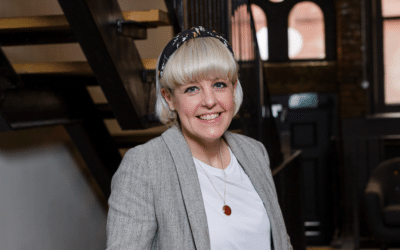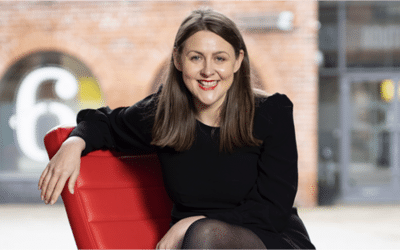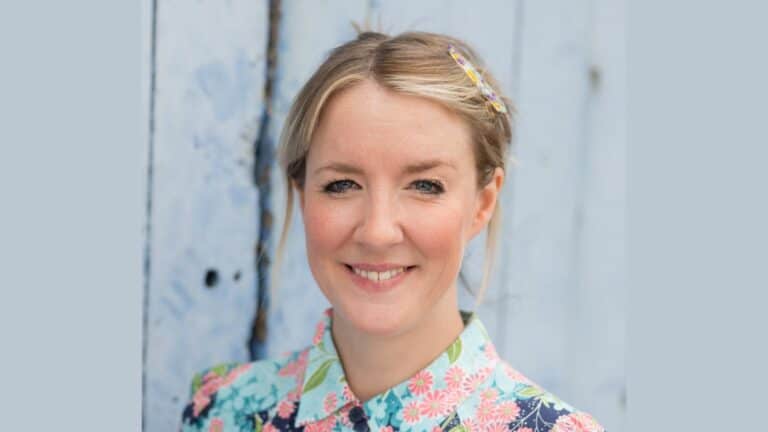Content Soup is a PR agency in Leeds.
It was launched by Nina Green and her business partner Jasmine Headley-Craik in 2014 and offers PR strategy and management for businesses of all sizes from start-ups to global brands.
Here, Green shares her career journey, tips and advice for aspiring PRs and business owners…
How did you first get into your industry?
I was painfully shy when I was younger but found my personality could come out in my writing. I wrote stories and poems, and could send a really great email or text. It was my love of writing and storytelling, and reading gossip magazines, that made me want to work in PR.
I did a PR degree and got work experience at a small PR agency in Leeds. After a few days on the job, they decided I was good enough to manage all their clients while the whole team went on a trip abroad! It was a real baptism of fire but amazing experience so early on in my career.
My first job out of uni was in a busy press office of an ambulance service, before I moved into agency world.
What do you love about your job?
I get to run a business with not one but two amazing women at the helm, doing what we love with clients we love. We need more of that! Boardrooms are still very male dominated.
We laugh every day. We’re very different people, but the dynamic works and throughout the years, we’ve worked out ways to lean into our respective strengths to make the business tick. We take all the wins, but we also learn so much from the losses. We are nine years in now and while it hasn’t been without its challenges, we couldn’t be prouder of what we’ve created at Content Soup. We’ve had so many successes, many of which we take for granted.
Who – or what – has inspired you in your career?
My dad, for being the kindest, nicest man you’ll ever meet but also a really successful businessman. My mum, for always teaching us to work hard, to have an eye for style and detail, to say thank you and to be a good host (work in progress!). My husband, because he never compromises on authenticity. All the managers that saw potential in me and promoted me throughout my career.
I’m grateful to so many people, but I also try and back myself more these days, because I always look for opportunities to do better in work and in life, generally.
What are the biggest challenges about your job?
Knock-backs, but it’s inevitable in this game isn’t it, we’re always putting ourselves out there. My confidence used to go quite quickly, but you develop a thicker skin as you get older and I definitely see failure now as a huge opportunity to grow.
I drive a lot of new business and at the time it can be frustrating when deals don’t happen or when you feel like you’re not getting anything back. I celebrate the little wins though and know that it’s the small steps that are the big steps in time.
What skills have been the most crucial to you succeeding in your career so far?
I think one of my real skills is knowing what’s relevant and what will resonate, which is something you can’t really teach. I’m culturally curious and interested in people and the world.
Being nice, is that a skill?! I just think if you always show kindness, are helpful, put some effort in around your weak spots and have a good work ethic, you’ll make it. Something good always comes back to you if you give a little more. And being able to build a network and connecting people is something I do quite naturally, but it’s a great skill to have.
I genuinely credit my first job as a waitress in a pub as my big career break, though. I learnt so many skills then that I’ve taken with me throughout my PR career – being good with customers to get tips, always staying one step ahead of the chef, mucking in with the washing up or wrapping cutlery when I had a spare minute. I’ve always tried to add value whichever job I’ve been in.
What was your first salary and what could someone getting into the industry expect to earn nowadays?
My first salary was £9,000 working as a PR assistant in an NHS Trust during a year-long placement from university. After university, I started on £12,000.
I think starting salaries now you can expect around £20,000.
What education or training would be most useful for someone looking to follow your career path?
I have always attributed my success to just getting on with people and getting on with the job in hand. I’ve always worked super hard, even when I didn’t love the work. A strong work ethic and good moral code is better than any training, in my opinion.
Surround yourself with people who inspire you and have traits that you admire and would like to emulate, and get yourself a mentor or coach to help you with specific growth areas.
What advice would you have for someone looking to follow your path?
Always, always say thank you to people if they help you out. Good manners go such a long way! Never lose a contact. Don’t be afraid to make mistakes, it’s the only way to grow. Don’t blag it and try and be all things to all people – bring in people who can fill your gaps instead.
I think we’re living in a much more inclusive world now where you can get to know people online and DM people you’ve never met before. It’s much easier to make connections so take advantage of that and build your network early on.
I increasingly focus on what impact I want to make in the end; what I want my son and stepson to learn from me. That means I always look for people and clients who I can do more meaningful work with, and who make me smile.











